Cryptocurrency Split: What It Means and How It Affects Your Holdings
When a cryptocurrency split, a change in a blockchain’s protocol that creates two separate versions of the ledger. Also known as blockchain fork, it happens when developers or miners can’t agree on rules — and the network splits in two. This isn’t just technical jargon. If you hold Bitcoin or any major coin, a split could mean free tokens — or total loss.
There are two main types: hard fork, a permanent divergence in the blockchain that requires all users to upgrade their software and soft fork, a backward-compatible update where old nodes still recognize new blocks. Hard forks are the ones that matter to you. They create new coins. Remember Bitcoin Cash? That came from a hard fork of Bitcoin in 2017. People who held Bitcoin at the time got free BCH. But not all forks are like that. Many vanish — no trading volume, no exchange support, no future. You might get a token that’s worth zero.
It’s not just about claiming free coins. A split can break your wallet, freeze your assets, or expose you to scams. Fake airdrops often pretend to be splits. If you get a message saying "claim your new coin after the split," it’s probably a trap. Real splits are announced by official project teams, not random Discord DMs. Your wallet needs to support the new chain. If you’re holding coins on an exchange, you don’t always get the new tokens — exchanges decide what to support, and many ignore small forks.
Why do splits happen? Usually because of disagreements over scaling, fees, or governance. Ethereum’s move to Proof of Stake was a soft fork — smooth and silent. Bitcoin’s split into Bitcoin Cash was a hard fork — loud and messy. Some splits solve real problems. Others are just marketing stunts. Look at the team, the code, the community. If nobody’s building after the split, the new coin dies fast.
You don’t need to understand every line of code, but you do need to know what to watch for. Check official project channels before any split. Don’t move coins right before a fork — that’s when scams thrive. Keep your private keys safe. And if you do get new tokens, don’t assume they’re valuable. Track them. Trade them. Or delete them. Most will be worthless.
Below, you’ll find real cases — from the Bitcoin Cash split that made headlines to dead tokens nobody remembers. We’ll show you which splits actually paid off, which ones were scams, and how to protect yourself when the next one hits.
What Happens During a Blockchain Fork: Soft, Hard, and How Communities Split
A blockchain fork splits the network into two versions when protocol rules change. Hard forks create new coins; soft forks upgrade without splitting. Success depends on community consensus, not just code.
